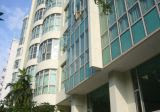Courting Penang's diaspora
23 June 2009
By Tan Boon Kean.
"PENANG people are not kiam [stingy]. They are just khiam [thrifty]," says Lim Guan Eng, chief minister of Penang, to a packed audience in Singapore. The crowd roars with laughter at the word play on the Hokkien dialect's intonation and the Malaysian state's reputation for parsimony. The joke had the non-Chinese and even non-Hokkien speaking Chinese diners quickly seeking an explanation from their friends.
The stage last Monday [June 15, 2009] was the old-world Kia Hiang Restaurant on Kim Tian Road, in the heritage area of Tiong Bahru in Singapore. In a way, the choice was a reflection of the traditional link between Singapore and Penang. This was not glitzy Orchard Road or uber cool Marina Bay.
It is a locale familiar to a settled diaspora; of old and young executives, including the CEO of a $1.8 billion Singapore-Exchange company, a chief surgeon, top doctors, senior lawyers, successful businessmen and women, and a sprinkling of senior civil servants as well. Yet, that night, at the event hosted by the Old Frees' Association (Singapore), they identified themselves as a roll call of Penang's premier institutions: Chung Ling High School, Penang Free School, St George's Girls' School and St Xavier's Institution, among them (in alphabetical order rather than ranking, lest I get drawn into a debate).
"Penangites have not only been losing income; they have also been losing relatives. Penang's families have been sending their sons and daughters abroad for a long time now - down to the Klang Valley in Selangor, over to Singapore, and out into the great wide world," Lim wrote in an op-ed published in Singapore's Straits Times that same day. "It is time Penangites reverse this trend."
And the chief minister was there that night to "re-connect" with the Penang diaspora in Singapore. Not so much to ask them to change their loyalties but to inform and encourage their support and feedback.
"Singapore, Medan, Hong Kong are our immediate targets. We are reaching out to people who know Penang. It is part of their life and they don't need much convincing but they need to reconsider Penang, to reconnect," Lim would elaborate the next day in an interview with The Edge Singapore's consulting editor Assif Shameen and myself.
It is something Singaporeans understand. After all, Singapore was built on waves of diasporas from the region and the world at large, attracted by work and business opportunities.Today, they're called "foreign talents" and the republic encourages them to stay permanently to further contribute to Singapore's growth.
The policy would seem timely. Just last week, the latest demographic data showed Singapore's birth rate continued to slip to only 1.28%. Yet, the population grew 5.5% to 4.84 million, due mostly to a new influx of non-residents and those taking up citizenship.
The search for top-class human capital is a global trend. Countries that have been seeing a net export of skilled labour, in particular, now work harder to encourage their diaspora to "return", whether with investment flows or their skills. India does it with special incentives for its NRIs (Non-Resident Indians) and China has its "sea turtles" (a term for returning students who have worked and stayed abroad) programmes.
"Ultimately, the aim is to make Penang a model that other cities and states in Malaysia will want to emulate," Lim wrote in his op-ed, outlining his vision. But it will be a tall order. Unlike Singapore, which was given sovereignty over large amounts of state land upon its separation from Malaysia in 1965 and could auction it to raise revenue (as with another former British colony, Hong Kong), Penang is small and state-owned land is scarce. Its hilly terrain, although filled with lush vistas, does not allow for wide swaths of plantations. Nor is it blessed with oil, like some other Malaysian states.
Minister Mentor Lee Kuan Yew's assessment of Penang's prospects as reported in The Straits Times last Tuesday were, candid: "I do not believe that he [Chief Minister Lim] can get the basic infrastructure up to mark without the support of the federal government and the federal government will only support him if he cooperates, and even then I'm not sure."
To this Finance Minister Tharman Shanmugaratnam, who accompanied Lee on his eight-day Malaysia tour, added, "They have to make calculations, politically and economically, as to what relationship they want with KL, in order to achieve the objective they want, which is to raise the standard of living in Penang."
Liew Chin Tong, the MP for Bukit Bendera and policy adviser to the Penang chief minister, who accompanied Lim to the dialogue, winced when he read this. "We are dependent on the federal government," he concedes, "but we are also dependent on foreign investors. Therefore, we will find alternatives and search for other models."
That explains why almost every other month the chief minister keeps reminding Putrajaya - Malaysia's administrative capital - that it should provide more funds. He knows he won't get it easily, but he needs to manage the expectations of the state's voters. Liew reminds any listener that Penang pays about RM3 billion ($1.2 billion) annually in taxes but gets back only about RM100 million in federal allocations. "Penang needs re-branding. Penang was an international city on par with Singapore years ago," he says. "It was more well-known than Phuket or Bali."
Nostalgia may get you a Unesco-Heritage-City designation but that's about it. "The question is, how do we create an environment so there is gainful employment? Having more foreign workers will only depress wages. We must move up the ladder," says Liew. It wasn't surprising then that among the first steps taken last week was Lim's announcement that he would soon set up a Penang-investment-promotions office in Singapore, which would field not only Singapore but also regional investor queries and feedback for the state.
The symbolism of a representative office in Singapore, the first by a Malaysian state government, should not be overlooked. It reflects the independence of the DAP-majority Penang state government and the relatively equal status and relationship it shares with its other Pakatan Rakyat coalition partners. One wonders if the previous Penang state government that was under Umno-dominated Barisan Nasional rule would have dared or been permitted to make such a move.
Instead of starting cold in faraway places where few know Penang (one is reminded of the Singapore Economic Development Board's pioneers who had to make 'cold calls' to get investors in the 1970s), Lim is cleverly re-working an old route, but with a new angle.
Cumulatively, to date, Singapore companies invested up to RM2.6 billion, accounting for more than 50% of total foreign direct investment awarded in the state. Lim wants to continue visiting the region and companies to deepen the connections. After his first visit last April 17, which included a call on Prime Minister Lee Hsien Loong, Lim says the stage is clear for "closer links".
"Penang is already designated as one of the BPO [business-process outsourcing] centres of the future, with its pool of young, trained, multi-lingual workers. We can meet almost all their demands," he says. "Many foreign investors are surprised at the capability of our engineers. There is also the intangible aspect - the living environment that is beautiful."
He however acknowledges that they are working hard to tackle the three Cs - crime, traffic congestion and cleanliness. When Lim said that, I could visualise the grubby state of George Town's Komtar complex, where the state government offices are located. That, doubtless did not impress the Singapore delegation when they arrived. Next to it is the brackish, sludgy Prangin Road canal, which certainly cannot compare with the Singapore River.
Still, the 48-year-old chief minister's enthusiasm is clearly infectious. He is also tenacious, having survived two terms of political detention and prison for his ideals. After all, he has no choice but to start from scratch as he has the expectations of the March 8, 2008 electoral groundswell behind him.
As the interview winds up, I find he has a packed schedule. He's off to Sentosa Development Corp, which oversees the burgeoning billion-dollar casino developments and other projects, and after that, it's Ascendas, the giant $9 billion industrial-parks manager.
Who knows, perhaps the chief minister will run into one or more Penang-diaspora executives with an accommodating ear?
http://mychiefministerlimguaneng.blogspot.com/2009/07/lim-guan-eng-in-singapore.html
Subscribe to:
Post Comments (Atom)



No comments:
Post a Comment